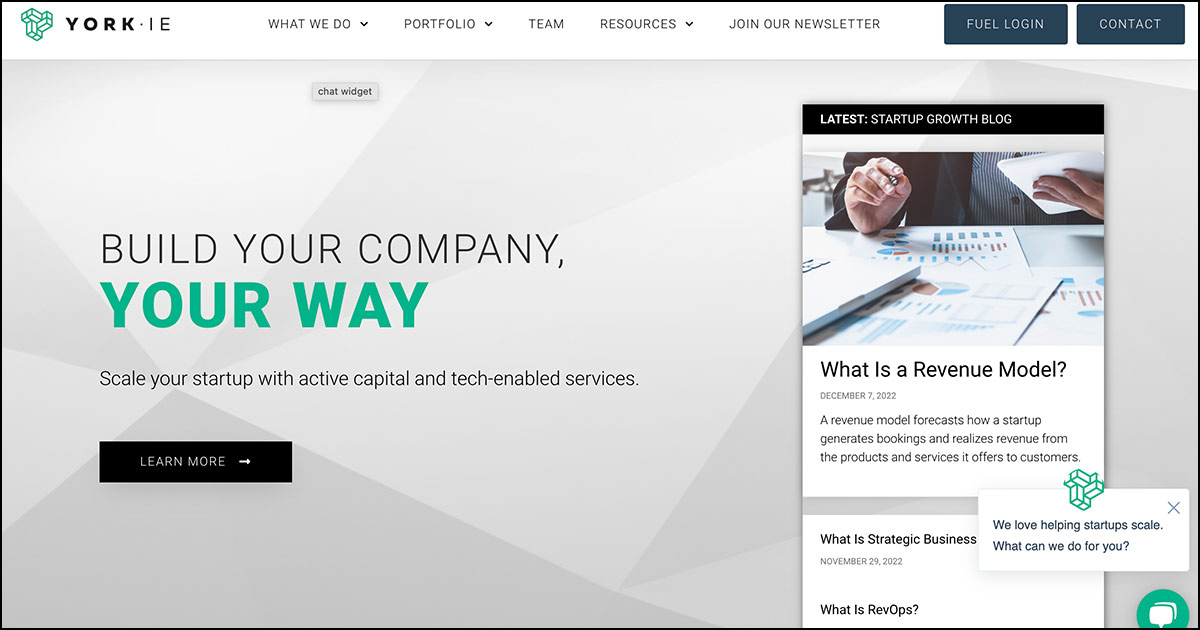Strategic Growth and Investments for Startups
The Origin Story of York IE

Last Updated: By TRUiC Team
As every founder can attest, building a successful, sustainable company is no easy feat. Challenges from product development to marketing to business development loom large. The good news is there are plenty of people out there to help new founders get their companies up and running. One of them is Kyle York, whose startup, York IE, offers strategic growth and investment advice and assistance for startups.
This is York IE’s origin story.
Leveraging Opportunities to Found a Startup
Kyle comes from a family of entrepreneurs. “I grew up in a family business and always knew I wanted to be entrepreneurial, and I think I happened to just get lucky in certifying tech and software early in my career,” he says. In part because entrepreneurship runs in his blood, Kyle earned a marketing degree from Bentley University and “naturally ended up on a marketing sales track early in my career in software.”
Eventually, Kyle co-founded and served as the chief revenue officer of Dyn, an internet infrastructure company. That company grew to about 500 employees, and Oracle purchased it in late 2016. “Parallel to that, given Dyn was an internet infrastructure company, a lot of tech founders, engineers would come to us with their new great idea in building the next great app or the next great cyber security company,” he says. “So I would work with all the fastest growth companies, and they would ask me a lot for help on their business model and their scaling plans.”
Soon Kyle had earned a reputation as someone with expertise in business growth and development, and he was asked to sit on independent and advisory boards. This presented investment opportunities. “I started to … invest right out of my W-2 income right back into other startups,” he said. “And by the time we left Oracle, myself, and my now co-founders had started to work together, and we had made over 60 investments in B2B software businesses.”
Kyle realized he might be able to leverage his experiences and expertise and start his own company. “Could this potentially be something that we could all do and scale as opposed to the advisory investing being moonlighting and having a full-time operator gig where you're always feeling you're cheating on the other? Could we do it in one package? And so that was really the manifestation of York IE. And we've been off and running since.”
A Vertically Integrated Model
Kyle and his co-founders wanted to position York IE as “more of this vertically integrated model where we could build an operating company that has resources, infrastructure capabilities, data,” he says.
As such, the company offers all types of startups a tech platform and various advisory services based on a “recurring-revenue, B2B-focused business model.” These services include market research and data automation platforms similar to an “operator version of a PitchBook or Crunchbase,” as well as templates, a live chat advisor, and more self-service support.
“The advisory services are tech-enabled services for MarCom, product development, business growth, go-to-market, and revenue operations, all leveraging that tech stack, but putting an advisory services manager and delivering those things more as custom scope of work type services for the startup ecosystem,” Kyle says.
York IE also offers a seed-stage investment pool called an Evergreen Syndicate, making 15 to 20 B2B SaaS investments in early-stage startups every year in partnership with high-net-worth individuals and family offices.
Philosophical Alignment
Kyle says it’s important for York IE and a particular startup or founder to have the same priorities.
“I do think it's a lot of philosophical alignment on how to build a company,” he says. “A lot of times these days, if you read TechCrunch or Business Insider or Reed, the Axios newsletter, everything's about [how] this company raised this much money at this valuation. Well, guess what? From day one, those companies tend to have a pitch deck even in their seed round where the milestones are fundraising events that are going to come into the future.”
By contrast, York IE looks for companies that appear to be sustainable and scalable. “I think our thesis is around founders who want to build a good and healthy and scalable business,” he says. “And yes, we're not against raising money or raising a lot of money if the market opportunity opens up for you, but not that being the sort of default de facto strategy to build a high-burn sort of underwhelming, unimpressive business.”
In other words, Kyle takes a very practical approach when it comes to selecting partner companies. “Typically, it's founders who are just much more business model-centric, are pragmatic, are really thoughtful about their plans,” he says. “They're believable; they don't need to be blow-the-socks-off – they need to be solid. If the market opportunity opens up, we'll support it.”
Tell Us Your Startup Story
Are you a startup founder and want to share your entrepreneurial journey withh our readers? Click below to contact us today!





